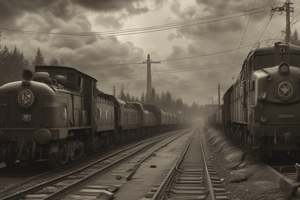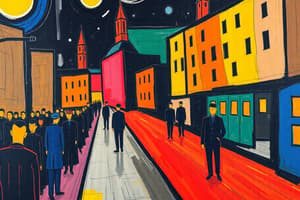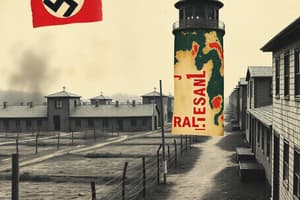Podcast
Questions and Answers
How did the Nuremberg laws affect a Jew at the time?
How did the Nuremberg laws affect a Jew at the time?
The Nuremberg laws canceled all the rights that Jews had in Germany, forbidding marriages between Jews and Germans and denying Jews the right to vote or be citizens of the Reich.
How would the laws affect how non-Jewish Germans saw the Jews?
How would the laws affect how non-Jewish Germans saw the Jews?
The laws reinforced the idea of Jews as a separate race, leading to the perception of Jews as different and a threat to the purity of German blood.
What surprises you about the Nazi's definition of a Jew?
What surprises you about the Nazi's definition of a Jew?
The surprise comes from the strict definition of a Jew based on ancestry, regardless of religious identity or practice.
What do the witness statement and photos tell you about what Kristallnacht must have been like?
What do the witness statement and photos tell you about what Kristallnacht must have been like?
What was the original meaning of the word 'holocaust'?
What was the original meaning of the word 'holocaust'?
Why is the term 'Shoah' preferred by some people?
Why is the term 'Shoah' preferred by some people?
What does the word 'Shoah' mean?
What does the word 'Shoah' mean?
What was the purpose of isolating Jews in ghettos?
What was the purpose of isolating Jews in ghettos?
What was the impact of isolating Jews in ghettos?
What was the impact of isolating Jews in ghettos?
Why do you think the Nazis implied that the Jewish inmates would be set free with the wording 'work will set you free' above the entrance to Auschwitz?
Why do you think the Nazis implied that the Jewish inmates would be set free with the wording 'work will set you free' above the entrance to Auschwitz?
What was the 'Final Solution'?
What was the 'Final Solution'?
What is the term 'Righteous Gentiles' used for?
What is the term 'Righteous Gentiles' used for?
What happened to most of the surviving Jews after the war?
What happened to most of the surviving Jews after the war?
Why was the Holocaust such a significant event?
Why was the Holocaust such a significant event?
Why do we still remember and learn about the Holocaust today?
Why do we still remember and learn about the Holocaust today?
Flashcards are hidden until you start studying
Study Notes
Nuremberg Laws Impact
- The Nuremberg Laws institutionalized racial discrimination, stripping Jews of citizenship and civil rights.
- Jews were categorized as second-class citizens, facing severe social and economic restrictions.
- Non-Jewish Germans were influenced to perceive Jews as outsiders, fueling antisemitic sentiment and justification for exclusion.
Nazi Definition of a Jew
- Nazis defined Jews based on racial criteria rather than religious beliefs, including anyone with Jewish grandparents.
- This broad definition surprised many, as it categorized individuals regardless of self-identification or practice.
Kristallnacht Insights
- Witness statements and photos depict a night of widespread violence and vandalism against Jewish properties and synagogues.
- The event marked a significant escalation in Nazi policies, igniting fear among Jewish communities.
Meaning of 'Holocaust'
- Originally, 'holocaust' referred to a sacrificial offering, often by fire, in religious contexts.
- The term has since evolved to describe the systematic extermination of Jews during World War II.
Preference for 'Shoah'
- 'Shoah' is preferred by some due to its Hebrew roots and less ambiguous connotations, focusing on the tragedy itself.
- The word 'Shoah' translates to "catastrophe" or "calamity," emphasizing the suffering inflicted upon the Jewish people.
Purpose of Jewish Ghettos
- Ghettos were established to isolate Jews from the general population, controlling their movement and interactions.
- This confinement aimed to facilitate the eventual deportation and extermination of Jewish communities.
Impact of Ghettos
- Living conditions in ghettos were dire, leading to overcrowding, starvation, and disease.
- Isolation dehumanized Jews and reinforced societal acceptance of their persecution.
'Work Will Set You Free'
- The phrase above Auschwitz was a cruel deception, suggesting that hard work could earn freedom, masking the true nature of extermination camps.
- It served as psychological manipulation to maintain compliance among inmates while denying the reality of their fate.
Final Solution
- The 'Final Solution' was the Nazi plan to systematically exterminate the Jewish population of Europe.
- It involved mass shootings, gas chambers, and other horrific methods of mass murder.
Righteous Gentiles
- 'Righteous Gentiles' refers to non-Jewish individuals who risked their lives to save Jews during the Holocaust.
- Their actions are recognized as acts of courage and humanity amidst widespread complicity.
Post-War Experiences of Jews
- Most surviving Jews faced immense challenges, including displacement, trauma, and loss of family.
- Many sought refuge in various countries, while others returned to their homelands, facing hostility or absence of community.
Significance of the Holocaust
- The Holocaust remains significant due to its unprecedented scale of human rights violations and genocide.
- It serves as a cautionary tale about the dangers of hatred, intolerance, and the consequences of apathy.
Continued Remembrance and Education
- Ongoing education about the Holocaust is essential to honor the victims and combat antisemitism.
- Memory serves as a tool for promoting awareness and preventing similar atrocities in the future.
Studying That Suits You
Use AI to generate personalized quizzes and flashcards to suit your learning preferences.




